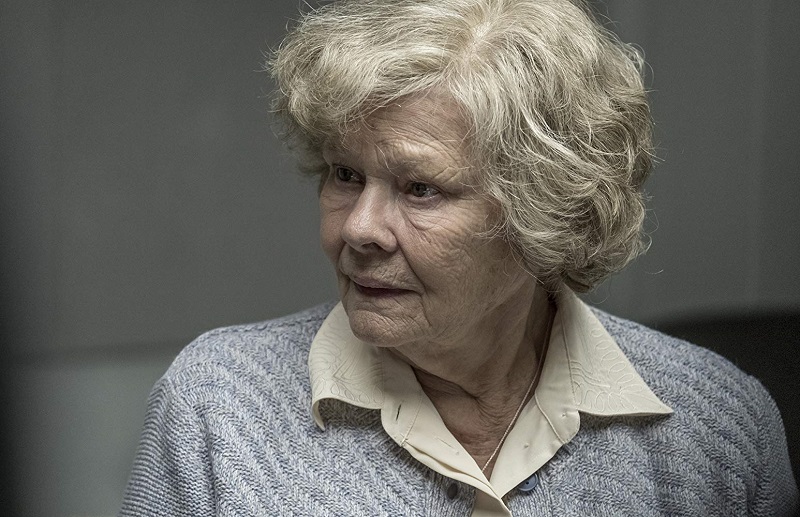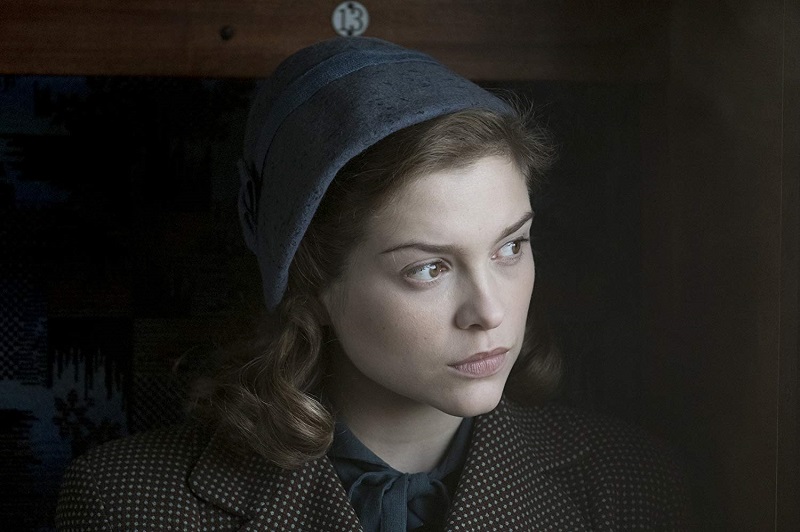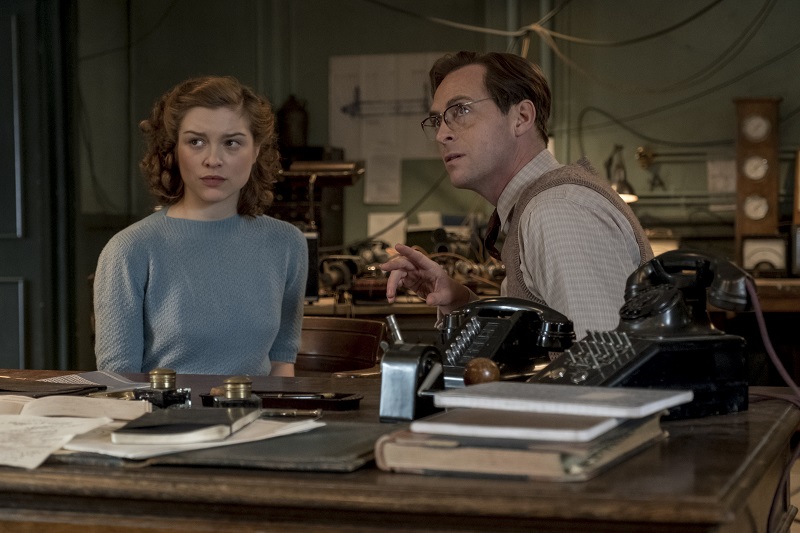The story of Red Joan is truly a fascinating journey through the Cold War from the point of view of a female scientist who was a trailblazer in her field, and also charged with being a traitor. The thing is, if you follow her reasoning for doing what she did … she was 100-percent correct in her assumptions made during the opening days of a Cold War that would be played out over five decades.

Oscar winner Judi Dench is Joan Stanley, our titular player. She is an 80-something enjoying those so-called golden years in her native Britain when law enforcement officials show up at her door and charge her with being a spy for the Soviet Union. Once in the interrogation room, not only is it time for Dench to work her movie magic, but also for our story to introduce its storytelling method of flashing back and forth between modern day and Joan’s past.
Several elements would converge and fatefully have Stanley intersecting with some of the most important national security issues of the 20th century.
In the late 1930s, Cambridge University was where many an aspiring communist flourished. As fascism was rearing its head across Europe—specifically in Germany and Italy—communism was among what stood between those Axis countries and total domination. So, it was hardly a surprise that Stanley would be connected, however minorly, with a communist action group at university and would have friends that too visited such meetings and social events.
Also, Stanley was way ahead of her time with her passion for science, specifically physics. After graduation, she found herself working with a professor—Max Davis (Stephen Campbell Moore)—who saw something in the young woman and made her a part of his team that was working against the clock in an effort to create the world’s first atomic bomb. The Nazis were actively on that path and as such, Allies the globe over were both privately and collectively racing to be the first to successfully test (and maybe even use) a nuclear weapon.
Red Joan paints the most fascinating of environments. Even though Canada, the United States and Great Britain were all striving for the same thing, some were more guarded about sharing secrets than others—i.e. America. A young Stanley (played brilliantly by Sophie Cookson) joins Davis on a trip to Canada where that nation’s scientists were willing to share with England with the hope of beating Germany to the bomb. America, on the other hand … let’s just say they kept their progress closer to the vest.

Dench’s Stanley spends much of her interrogation and house arrest time presenting a front that has her appearing to be some docile old lady living out her years. Sure, she had a past that flirted with communism, but she loved and loves her country, she swears. As the information by investigators is revealed, and as we see in these flashbacks, a truth starts to come into focus that is as serious as it is profound.
The scenes between Dench and her onscreen son, Nick (Ben Miles) are so rich. He is an attorney who could help his mother, but firmly believes it will be career suicide to aide her in her defense. First, he must get over the shock of the reality that what the government is claiming may be true. There is nothing that Dench cannot do, and it is rare that the actress achieves something onscreen that shocks us—given the fabled stage and screen work that she’s delivered over the decades. Her work in Red Joan does just that. There is an evolution to her performance that is snail-like in pace but possesses the seismic power of a roaring lion when all is said and done. History has shown us the truth of this case, so there is no danger of spoiling anything. Still, not wanting to alter the cinematic experience of anyone who might not know Stanley’s fate, I’ll keep details on the lower end of revealing.
Let’s just say that history is complicated and during wartime people do things that during peacetime they would never consider in a million years. When it is revealed that the Americans have cracked the atomic bomb mystery and successfully tested one in the desert, there is a scramble to get that information by Canada and Britain—all the while going to the ends of the earth to keep it out of the hands of the Soviet Union. Britain and Canada, with a little help from America, got all the information they needed to build a bomb.
Then, the United States used theirs … twice.
The horrific newsreels that spotlight the two Japanese cities after the bomb exploded induced terror, shock and utter awe in everyone, even those charged with building a bomb like Stanley and her militarized scientific colleagues.
There is something that always stuck with me while studying Political Science at George Washington University in the days before the Berlin Wall fell—the concept of Mutual Destruction. It embodied the idea that after seeing the effects of a nuclear weapon in Japan, everyone who had a bomb would fear using the bomb. Why? Simply put, if their enemies too had a nuclear weapon and could use it as retaliation for an atomic attack, then a realization that “no one wins” a nuclear war starts to take hold.
Somebody gave the secrets to making a successful nuclear bomb to the Soviet Union soon after the Americans had exploded two of the weapons in Japan. Soon after that, the Soviets too had successfully tested a bomb. The post-war superpowers, Russia and America, now had an ever-building legion of nuclear weapons pointed at each other. Each would never use their arsenal on the other because they knew that their own country would be wiped out as well. Mutual destruction. It is an idea that the person behind giving the Soviets the secret to the bomb used to defend what they did. Everyone would consider that treason, and charges would be filed and enforced. Let us make one thing clear. By giving the bomb to the Russians, this person did ensure a Cold War, yes, that would ensnare the globe for five decades. But they also ensured peace and a world where not one country would drop another nuclear weapon on another ever again.
What’s that about ends justifying the means? Red Joan does many things well, but its biggest gift must be how it will spur conversation about the history of nuclear weaponry and its role in a peaceful conclusion to a Cold War.
Dench, as always, is terrific. She portrays a character that has our heart and even though she is alleged to have done something unforgiveable—sharing secrets with the enemy—the viewer cannot help but have loads of empathy for her and what she is accused of doing. What is no easy task, is the one undertaken by the actress charged with playing a young Stanley, Cookson. There may be no better actress than Dench at her best and somehow Cookson manages to give us a turn that mirrors what the lauded legend delivered. Witnessing the two work independently in a way that collectively produces a single soul is a lesson in thespian triumph of the highest order.
Also powerful is Moore. His role is tragic in many ways as he was the one arrested for giving secrets to the Soviets back in the 1940s. He and Joan have palpable chemistry that finds us getting a fateful love story in the middle of our spy thrills. It is a characterization by Moore that must “hang over” Dench’s modern times and how their son invokes his father’s memory and good name while Moore processes this entirely revolutionary new view of who and what his parents were.

Behind the scenes, Trevor Nunn’s direction is divine. He has a way with his actors and the tone that is required to keep a grip on viewers as the story bounces back and forth through history like a pinball. A priceless roadmap was provided by Lindsay Shapero’s script. She turned in a historically accurate and astute screenplay that is simultaneously entertaining and enlightening. It possesses all the elements that make a classic spy thriller work, all while serving as a film that spotlights many aspects of history that not many know about. For example, the communism fascination by Brits in the late 30s. Also, the nuclear science political sprint that all Allies undertook that was as complicated as the physics and chemistry that lay at the heart of building the weapon.
Red Joan requires much of its viewer as well. It will not hold your hand and insists you pay attention because what it has to say is important and something that history buffs, political junkies and novices in both those arenas will gravitate towards.
Grade: A

